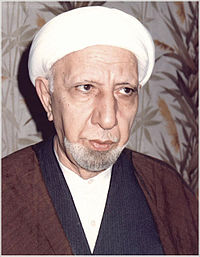- Ahmed Al-Waeli
-
Aḥmad Al-Waeli
الشيخ أحمد الوائلي
Shia clericBorn 1928
Najaf, IraqDied 2003
al-Kazimiya, IraqReligion Shia Islam Ahmed Al-Waeli (1928–2003) (Arabic: الدكتور الشيخ أحمد الوائلي) is one of the most well-known Shi'a Islamic prominent clerks in the twentieth century. He preached the Islamic thoughts through books and lectures. He is also a poet. His poems represent his personality, spirituality and belief.
Contents
Biography
Ahmed Al-Waeli was born in September, 1928 in Najaf, Iraq. He came from a very well cultured family. His father (Sheikh Hassoun Al-Waeli) was also a religious clerk and a poet. However, he did not become as famous as his son Ahmed. From his youth, Ahmed Al-Waeli was smart and ambitious. He studied and memorized the Qur'an when he was seven years old. He graduated with an honor degree in 1962 in Arabic language and Islamic Jurisprudence. Then, he pursued his education in the institute of higher education –one of the institutes of university of Baghdad- and finished his master degree in the same subject. The title of his thesis is “Custody Rules in Sharia and Law” which was published as a book later. He then left Iraq and went to Egypt to pursue his doctorate education. He received his PhD in economics in 1978 and his dissertation discusses the Islamic view of exploitation of labor.
As Najaf is famous with Shiite Islamic religious schools and Arabic literature, Al-Waeli studied under prominent religious figures. He learned lecturing through a group of Islamic lecturers including Sayyid Baqir Slaimoun. He gained great admiration from his teachers through his intelligence, articulation, and presentation style. Ayatollah Imam Khomeini called him “the Mobile Library” as he was spreading his rich knowledge as well as lecturing the philosophy of Islamic jurisprudences in different places. Likewise, Grand Ayatollah Abul-Qassim Khoei called him "the Tongue of Shia" as his voice represents Shitte ideology. One of his common messages in his lectures is that the differences between Shia and Sunnah jurisprudences should not create tension between the two sects since both sects ultimately have the same goal (which is getting closer to Allah). He repeatedly conveys that each sect has his own Ijtihad (interpretation of Hadith) but that should not create tension. He always condemns those who call Shia non-Muslims.
Al-Waeli died on July 14, 2003 in his homeland after 24 years in exile. Thousands of people gathered in his funeral in the city of Karbala to express their sorrow and sympathy for his departure.
Presentation style
Al-Waeli has become famous with his presentation and lecturing style. In fact, his lecturing style (or school) is now known as “Al-Waeli’s School of Lecturing.” The main characteristics of this school are:
1. Topic Focus: this is the most important characteristic in this school. Unlike other Islamic lecturers, Al-Waeli concentrates only on one subject in each lecture and does not branch out to different subjects. The purpose of this is to avoid confusing and losing the audience’s attention, and to provide enough details to cover the subject. This is not an easy task. In fact, it requires a big effort from the lecturer to study the subject thoroughly before lecturing to make sure that all aspects of the topic are covered. Besides, he starts his presentation with a short statement that describes the focus of his lecture. This statement is usually a verse from the Qur'an.
2. Courage and Sincerity: His confidence and knowledge gave him the courage to speak the truth and defend his school of thought.
3. Audience Evaluation: Al-Waeli has the ability to evaluate his audience before lecturing. This ability simplified the choice and depth of the topic he would present. Also, through this ability, he gained the audience’s attention and interest.
4. Voice Pitch: Al-Waeli’s vocal quality helped him articulate his speech.
5. High Morals: Al-Walei is known for his high morals and virtues which developed his charisma and power of persuasion.
Books
Al-Waeli wrote several books including:
- The Essence of Shiism
- Custody Rules in Sharia and Law
- Sex Fiqh in the Islamic Schools of Thought
- Islamic View of Exploitation of Labor
- The Defense of Truth
- My Experience with Husayni Pulpit
- Toward a Scientific Interpretation of Qur'an
External links
- http://www.Al-Waeli.com/ (Arabic)
- http://www.alwaeli.org/ (Arabic)
- http://www.kerbalaya.net/hashemya5/a1a/indexa1a.htm (Arabic)
- http://www.shiaweb.org/v2/sounds/viewcat_72.html (Arabic)
Categories:- 1928 births
- 2003 deaths
- Shi'a clerics
- People from Najaf
- Iraqi Shi'a Muslims
Wikimedia Foundation. 2010.
